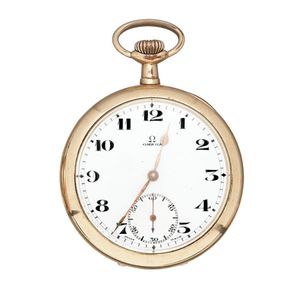18ct Gold Quarter Repeating Watch by James Green London
You must be a subscriber, and be logged in to view price and dealer details.
Subscribe Now to view actual auction price for this item
When you subscribe, you have the option of setting the currency in which to display prices to $Au, $US, $NZ or Stg.
- Foliate - Decorated with leaves or leaf-like forms.
- Pair Cased - A pair cased watch is one with a double case. The movement is encased, and for additional protection this is fitted into an outer case.
- Circa - A Latin term meaning 'about', often used in the antique trade to give an approximate date for the piece, usually considered to be five years on either side of the circa year. Thus, circa 1900 means the piece was made about 1900, probably between 1895 and 1905. The expression is sometimes abbreviated to c.1900.
- Movement - The technical name for the workings of a clock or watch, and does not include the dial or case.
- Floral Swag / Garland / Festoon - Floral swags are a decorative motif often used in the ornamentation of various objects, such as silverware, glassware, and furniture. The term "swag" refers to a garland or wreath of flowers, foliage, or other decorative elements, which is usually arranged in a loop or curve.
Floral swags can be found in a variety of decorative styles, from ornate Baroque and Rococo designs to more naturalistic Art Nouveau and Art Deco styles. They are often used to add a touch of elegance, refinement, or whimsy to an object, and can be seen on a range of items from chandeliers and candlesticks to picture frames and tea sets.
In the decoration of silver objects, floral swags are often used to accentuate the curves and lines of the piece, and to add visual interest to the surface. Similarly, on glass objects, floral swags may be used to frame or highlight a particular area of the object, or to add a touch of color and delicacy.
On furniture, floral swags can be found on a variety of pieces, from cabinets and armoires to chairs and sofas. They are often used to enhance the lines and curves of the furniture, and can be used to create a sense of movement and flow in the design.
Overall, floral swags are a versatile decorative element that can be adapted to a range of styles and applications, and have been used in the decoration of various objects throughout history. - Fusee - The fusee movement was used in clocks and pocket watches from the mid 17th century. The fusee is a cone shaped drum within the works that is linked to the barrel of the spring, usually by a length of chain.
As the mainspring loses its tension over time, the cone shaped barrel compensates for this by increasing the tension, by pulling the mainspring tighter, thus ensuring the time remains constant.
Use of the fusee in clocks was superseded by the "going barrel" in the mid 19th century and for pocket watches at the beginning of the 19th century.
The fusee continued to be used in marine chronometers until the 1970s.
This item has been included into following indexes:
-
pocket watches, case type
- open face, gold / gold-plated case 1,381
- pair cased 165
- pocket watches, features - repeater / repeating 107
- pocket watches, period - Georgian 289
Visually similar items

Rolled gold pocket watch. Appears operational but May need service. Enamel dial chipped.

An Omega Swiss pocket watch in American Elgin case, the gold plated open face case marked Elgin USA and fitted with a Swiss Omega lever movement N.5916131, date 1922. Enamel dial in good order.

A sterling silver Roman dial pocket watch in double case hallmarked on outer case; maker HV, London, 1832. Diameter 5 cm.

W H Tuxford Boston 18ct gold pair cased watch Mvt 27822, circa 1880, fusee lever movement, white enamel dial, Roman numerals, subsidary seconds, plain polished case, with watch key, movement signed, diameter 53 mm
